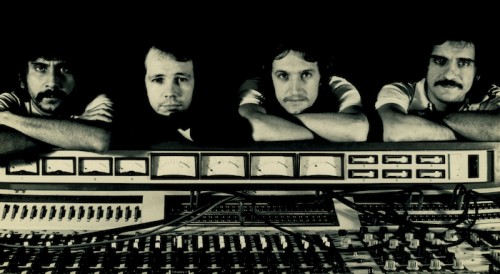Jan 13, 2026 2:09 PM
More Trump-Kennedy Center Cancellations
The fallout from the renaming of the John F. Kennedy Center for the Performing Arts to include President Donald…

Alex Malheiros (left), José Roberto Bertrami, Ariovaldo Contesini and Ivan Conti began playing as Azymuth in the early ’70s.
(Photo: Courtesy Far Out)Saquarema is a little town two hours outside of Rio De Janeiro, home to 50 miles of pristine coastland, fringed with white sand beaches. One-hundred thousand dollars would be enough to purchase a mansion there, making it an ideal retirement location. Yet, there’s at least one resident not quite ready make relaxation their full-time job.
“I am 72 years old,” Ivan Conti said, speaking by phone from his home on the beach in that coastal city. “But my mind is very new. It doesn’t matter, the age.”
Conti is the longtime drummer of progressive jazz-rock trio Azymuth, founded in the early ’70s by the late keyboardist José Roberto Bertrami. The band was one of the first to blend rock and jazz aesthetics with traditional samba dance rhythms, spawning a whole new subgenre of fusion called samba doido, or crazy samba, a sound mirrored in the first iterations of the Chick Corea-led Return To Forever. Original members Conti, bassist Alex Malheiros and current keyboardist Kiko Continentino (who took over for Bertrami after his 2012 death) continue to tour throughout Brazil and Europe, even journeying to Los Angeles in early June for a standing-room-only lovefest at the Lodge Room in Highland Park.
Conti’s the subject of renewed interest, in part, due to Azymuth’s late-stage resurgence, and from two recent recordings: Demos (1973-75) Volumes 1 & 2—a double-album of previously unreleased material by Azymuth, and his own new leader date, Poison Fruit.
These two releases were recorded more than 45 years apart, yet have much in common, even beyond Conti’s energetic drumming: Both began as informal rehearsals that quickly evolved into something larger. And both contain elements that defined Azymuth’s sound concept: funk-inspired bass and drums, electric piano, organ and analog synths, and ostinato grooves and vamps, always with a backdrop of samba.
Conti recalled how Bertrami invited him and Malheiros to the late keyboardist’s house on the weekends to play. The trio had been doing a lot of session work together in Rio at the time, and Bertrami wanted to see what they could do on their own.
Even in its raw, live setting, the playing is nearly flawless, with urgent, virtuoso performances from all three musicians, who each were battle-tested from countless hours of session work. Most of the tracks were based on ideas the players came up with during breaks in sessions for other artists.
“The rehearsals were like we did in the recording studio, but it was for us,” said Conti, recalling how they loved “to spend our free time to make experiences. We enjoyed what each one touched.” Only a handful of tracks ended up on subsequent Azymuth albums, meaning a plethora of new music now exists for ardent fans of the band to discover.
Four decades later, Conti was tinkering around in his home studio, perfecting his recorded drum sound while working on Poison Fruit, and invited his son, Thiago, to lay down some bass and guitar tracks. Many other musicians (including his Azymuth bandmates) ultimately contributed to the new project, Conti’s first album in more than 20 years.
“In three months,” Conti said, “I do everything, and ... I have more. Every day, I come to the studio and do a new song. I like it too much.”
He explains that the title, Poison Fruit, is translated from the Brazilian word mamona, which then becomes a play on the word mamão, which means “papaya,” and has been Conti’s nickname since he destroyed a papaya tree as a boy. Mamão has, ironically, become an advocate for the conservation of the Amazon rainforests, and he said of Poison Fruit, “to me, [it’s] an ecological album. I talk about the birds, I talk about the trees, I talk about the [indigenous peoples].”
Conti’s own music also contemporizes with an electronic component; since 2005, he’s been collaborating with DJs.
“I remember Roni Size in England,” he said, recalling the time in the early 2000s when electronic dance music swept through Brazil. “Wow, what’s this? It’s so different.”
He ended up playing with Roni Size in Brazil, the first of many DJ collaborators, including DJ Nuts and Madlib. Included on Poison Fruit are remixes of the original tracks produced by local Brazilian DJs, evidence of the septuagenarian’s lasting influence on an emerging generation. “We like to do something new,” Conti asserted. “It’s fantastic, this combination of DJs and musicians. I like it.” DB

Belá Fleck during an interview with Fredrika Whitfield on CNN.
Jan 13, 2026 2:09 PM
The fallout from the renaming of the John F. Kennedy Center for the Performing Arts to include President Donald…

Peplowski first came to prominence in legacy swing bands, including the final iteration of the Benny Goodman Orchestra, before beginning a solo career in the late 1980s.
Feb 3, 2026 12:10 AM
Ken Peplowski, a clarinetist and tenor saxophonist who straddled the worlds of traditional and modern jazz, died Feb. 2…

The success of Oregon’s first album, 1971’s Music Of Another Present Era, allowed Towner to establish a solo career.
Jan 19, 2026 5:02 PM
Ralph Towner, a guitarist and composer who blended multiple genres, including jazz — and throughout them all remained…

Rico’s Anti-Microbial Instrument Swab
Jan 19, 2026 2:48 PM
With this year’s NAMM Show right around the corner, we can look forward to plenty of new and innovative instruments…

Richie Beirach was particularly renowned for his approach to chromatic harmony, which he used to improvise reharmonizations of originals and standards.
Jan 27, 2026 11:19 AM
Richie Beirach, a pianist and composer who channeled a knowledge of modern classical music into his jazz practice,…